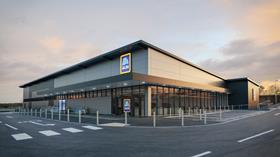
Artificial intelligence and supply chain optimisation could prove key to helping the big four maintain and grow their market share, according to stock replenishment service Blue Yonder.
The company, whose Replenishment Optimisation system allows retailers to automatically restock their grocery products, sees opportunities to make the service more accurate and targeted by integrating existing data with AI technology.
Crucially this can help reduce the amount of in-store waste, while also reducing the need for retailers to make manual interventions when restocking.
With the rise of Lidl and Aldi, the UK's traditional supermarket giants are facing significant challenges to maintain their sales volume and market share.
Adding in the economic turmoil caused by Brexit and interest rate rises, it is now especially important that the big four reduce their costs, Blue Yonder said.
Figures released by Kantar Worldpanel this week showed that sales at each of the big four retailers rose, extending a run of strong sales growth in recent months. But the discounters continue to grow at pace, gradually closing gap in terms of market share.
Lidl, now the UK’s seventh largest supermarket, enjoyed sales rises of 15.1 per cent in the 12 weeks to 5 November 2017. Aldi, meanwhile, saw its sales increase by 13.1 per cent, pushing the retailer’s market share to 6.7 per cent. It is currently the UK's fifth-largest supermarket.
Blue Yonder, which already works with Morrisons, believes technological advances to reduce waste can help Britain’s major retailers boost their profits and combat the growth of the discounters.
The company’s chief executive Uwe Weiss said: “Innovative technology and the optimisation of the supply chain will be critical to ensuring that the UK’s big, traditional retailers remain profitable and arrest the decline in their market share.
“One of the most significant costs on a retailer’s balance sheet is wasted stock, and products that they cannot sell. Every item of food that is wasted is a potential sale lost.
“Alternatively, if supermarkets cannot guarantee that they will always have the right products on the shelves, they may lose customers to their rivals.
“Either way, retailers cannot afford to have a less than optimal supply chain, and it is here that where artificial intelligence and automation can help retailers gain a competitive edge.”
By using data from a retailer’s online channels and in-store points of sale, and combining it with additional information such as past sales patterns, Blue Yonder helps supermarkets make informed decisions on how and when to replenish their products.
“When this data is integrated with advanced AI technology, stock replenishment is much more accurate and is optimised to customer demand,” Weiss added.
“Forecasting and replenishment solutions can automate stock level decisions, across thousands of product categories and hundreds of stores.
“Based on the business strategy, retailers can manage their stock with greater agility and reduce their costs, helping them to maintain their position in the market and grow their sales.”



